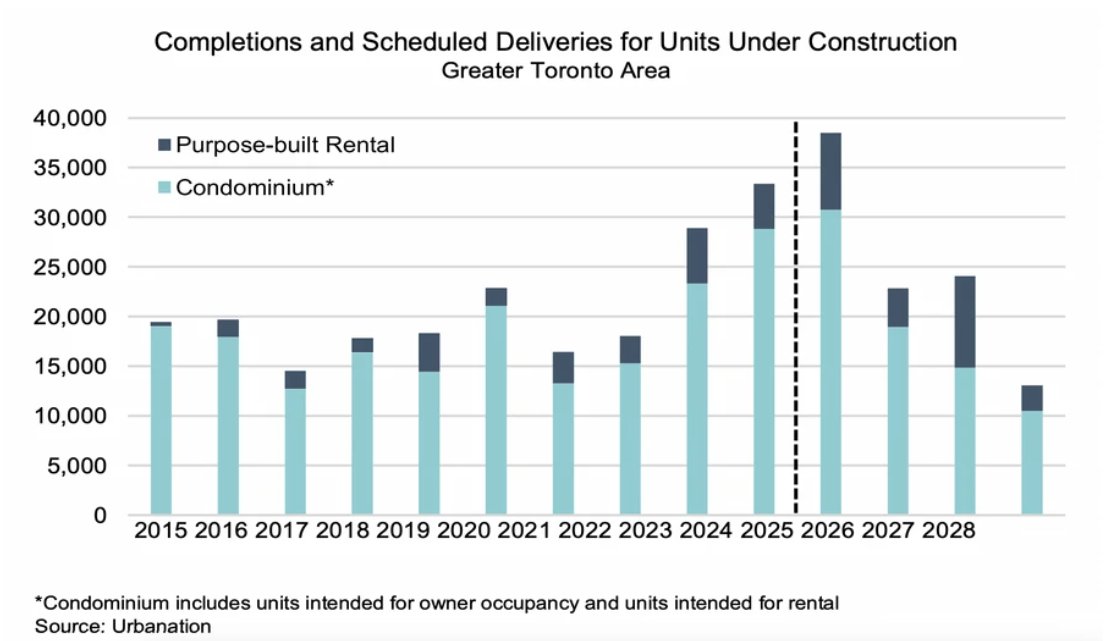Toronto's condo market is experiencing its most dramatic correction in decades. With prices plummeting, inventory at record highs, and desperate sellers accepting massive losses, the term "fire sale" isn't hyperbole, it's the new reality. But does this chaos represent a generational buying opportunity, or are there hidden dangers lurking beneath these seemingly attractive prices?
The Numbers Don't Lie: This Is a Historic Market Reset
The scale of the Toronto condo market collapse is staggering.
Average condo prices have dropped 7% year-over-year to $571,500 as of August 2025, with prices now back to levels last seen in early 2021. But these headline numbers mask an even more troubling reality: individual units are trading at catastrophic losses.
Consider these recent examples:
- A Yorkville luxury condo sold for $2.35 million in September 2025—an $800,000 loss from its $3.15 million purchase price just six months earlier
- Assignment sales show buyers willing to accept $200,000 to $700,000 losses just to escape their contracts
- The $350,000 condo has returned to downtown Toronto, with 16 units selling at or below this price point in 2025—a price point that had virtually disappeared between 2019 and 2024
Perhaps most telling: distressed sellers are unloading units at steep discounts compared to what identical units in the same buildings sold for within the past year, effectively resetting prices for entire buildings.
Why Is This Happening? The Perfect Storm
Multiple factors have converged to create this market crisis:
1. Record Supply Tsunami
Toronto faces an unprecedented wave of inventory. Approximately 31,000-40,000 new condo units are completing in 2025 alone—a record high. Meanwhile, active listings have surged 35% year-over-year, and unsold inventory has reached 23,918 units, representing 78 months of supply (seven times higher than balanced levels).
The chart you've provided illustrates this perfectly: 2026 shows nearly 40,000 completions, the highest spike in the Greater Toronto Area's history. This represents units that were purchased years ago when the market was booming, now arriving into a fundamentally different economic reality.
2. The Investor Exodus
Individual investors—traditionally the backbone of Toronto's pre-construction market—have fled en masse. Why? The math simply doesn't work anymore:
- Carrying costs (mortgage, maintenance, property tax) have grown 24% since 2022
- Average rents have only increased 15% over the same period
- Many investor-owned units now generate negative cash flow of $1,000+ monthly
Sales of new condos in Toronto fell 64% in 2024 compared to 2023, hitting the lowest level since 1996. In Q1 2025, only 215 new condos sold in the City of Toronto—the lowest since 1990.
3. The Assignment Market Bloodbath
The assignment market, where buyers flip pre-construction contracts before completion, has become a graveyard of broken dreams. Buyers who purchased at peak prices in 2021-2022 are now facing losses of $100,000 to $200,000 on average, with some catastrophic cases exceeding $500,000 to $700,000.
One real estate specialist reported having a client with 135 pre-construction units sitting on "catastrophic losses." Agents specializing in this market have written off nearly $600,000 in commissions from deals that fell apart.
4. Financing Difficulties for Closings
Many buyers who signed purchase agreements years ago are struggling to close because:
- Lenders will only finance based on current market values, not original purchase prices
- The gap between contract price and current appraisal can be 20-30%
- Buyers must cover this difference with cash they don't have
Based on prices of recently occupied new condos versus similar resale units, investors potentially face up to 6% in capital losses on pre-construction purchases from 2024.
5. Economic Headwinds
The broader economic environment remains challenging:
- Interest rates, while declining, remain significantly higher than the 2020-2021 era
- U.S. tariffs have increased construction costs and created market uncertainty
- Canada's population growth has flatlined after immigration policy changes
- Toronto experienced a net loss of nearly 10,000 people in their twenties and thirties to other parts of Canada in 2024
The Case for Buying Now: Legitimate Opportunities
Despite the carnage, there are compelling reasons to consider buying in this market:
Prices Have Genuinely Reset
Adjusted for inflation, Toronto condo values have rolled back below 2017 levels. For buyers with cash or strong financing, this represents a significant discount from peak prices. One-bedroom condos in desirable downtown locations are now available for $400,000—prices that seemed impossible just two years ago.
Buyer Power Is at a Decade High
With inventory surging and sales declining, buyers have unprecedented negotiating leverage:
- Homes are selling for 3% below asking price on average
- Days on market have increased to 49 days (up from 44 last year)
- Sales-to-new-listings ratio sits at 37%, firmly in buyer's market territory
- Only 16% of condos are selling over asking (down from 30-40% in hot markets)
Quality Units Are Available
The distress isn't limited to poorly located or low-quality units. Luxury condos in prime areas like Yorkville, the waterfront, and near Kensington Market are trading at massive discounts. For buyers willing to act, these represent opportunities to access buildings and locations that would typically be out of reach.
Future Supply Constraints Are Coming
While today's market is drowning in inventory, tomorrow's market faces a supply crisis. Construction starts have collapsed by 79% in Q1 2025, reaching the lowest level since 1996. Only 1,276 units started construction in Q2 2025, down 84% from two years ago.

This means:
- Completions will drop to 17,487 units in 2026 (down from 31,000+ in 2025)
- By 2027-2028, severe supply shortages are likely
- Developers have cancelled or put on hold 28 projects totaling 5,734 units since early 2024
RBC Economics projects that inventory needs to fall approximately 25% before the pre-construction market regains momentum, with recovery expected in late 2026 and more robust activity in 2027.
Interest Rates Are Declining
The Bank of Canada has been cutting rates since June 2024, with the current 5-year variable rate at 3.79% (as of September 2025). While not as low as pandemic-era rates, further cuts are expected, which will:
- Reduce monthly carrying costs for buyers
- Improve affordability metrics
- Eventually stimulate demand
The Case Against Buying: Serious Risks Remain
However, significant risks should give prospective buyers pause:
Prices May Continue Falling
While prices have dropped considerably, there's no clear floor in sight:
- The supply wave continues through late 2025 and early 2026
- More distressed sellers will emerge as additional units complete
- Each fire sale can reset pricing for entire buildings downward
- Economic uncertainty from U.S. trade policies persists
Move Smartly's September 2025 report warns: "Toronto's housing market is adjusting to a new reality: slower demand, more supply, and prices that may need to fall further before stability returns."
The Falling Knife Problem
Buying in a declining market means you could see your investment lose value immediately after purchase. One buyer lost $800,000 just six months after buying. While you might get a deal today, you could get an even better deal in six months.
Assessment and Financing Challenges
Banks are increasingly conservative with condo valuations:
- Appraisals are coming in below recent comparable sales
- Lenders may require larger down payments
- Mortgage stress test requirements remain stringent
Condo Fees and Special Assessments
New buildings often face:
- Rising maintenance fees as initial developer subsidies expire
- Special assessments for construction deficiencies
- Reserve fund shortfalls requiring owner contributions
- Management companies selected by developers (not owners)
Rental Market Weakness
For investors, the rental market offers little relief:
- Average Toronto rents declined 3% year-over-year to $2,606
- Competition from investor-owned units is intense
- Many units generate negative cash flow even at market rents
- Future rent growth is uncertain given economic conditions
What the Data Tells Us: A Market in Transition
The Toronto condo market is clearly oversupplied in the short term but faces potential undersupply by 2027-2028. This creates a timing paradox: buy too early and watch prices fall further; wait too long and miss the bottom while facing future supply shortages.
Key market indicators as of August-September 2025:
- Average condo price: $571,500-$664,841 (depending on area)
- Year-over-year change: -4% to -7%
- Active inventory: Up 18-35% YoY
- Sales activity: Down 2-3.4% YoY
- Months of inventory: 6.8 months (above balanced levels)
- Unsold new inventory: 23,918 units (78 months of supply)
Who Should Buy Now?
This market may be right for you if:
You're a Long-Term Owner-Occupier
- You need a place to live and can afford current prices
- You're comfortable holding through potential further declines
- You have stable employment and emergency reserves
- You plan to stay 5-10+ years
You Have Significant Cash Reserves
- You can put down 25-35% and still have 12+ months of reserves
- You can weather special assessments or maintenance fee increases
- You're not relying on immediate equity appreciation
You're Targeting Specific Quality or Location
- You've identified a truly exceptional unit at a significant discount
- The location has strong long-term fundamentals (transit, employment)
- The building has solid financials and low condo fees
You're Contrarian and Patient
- You're buying for 2027-2030, not 2025-2026
- You can handle watching your investment decline short-term
- You believe in Toronto's long-term growth story
Who Should Wait?
Consider holding off if:
You Need Short-Term Appreciation
- You plan to sell within 3-5 years
- You're counting on equity for future plans
- You have limited cash reserves beyond the down payment
You're an Investor Seeking Cash Flow
- Current rents don't justify purchase prices for positive cash flow
- You need immediate returns on investment
- You can't sustain negative monthly cash flow for 2-3+ years
You're Risk-Averse
- Market volatility keeps you up at night
- You prefer to buy in stable or rising markets
- A 10-20% paper loss would cause significant stress
You're Speculating on a Quick Flip
- The assignment market is broken
- Transaction costs make short-term flips unprofitable
- Speculation drove the bubble; speculators are getting crushed in the burst
The Bottom Line: Timing Versus Time in the Market
Is there a fire sale on Toronto condos? Absolutely. Units are trading at massive discounts, inventory is at record highs, and desperate sellers are accepting extraordinary losses. The question isn't whether deals exist—they clearly do.
The real question is: has the market found its bottom?
The data suggests we're in the middle innings of this correction, not the final ones. The completion wave continues through 2025 and early 2026, more distressed sellers will emerge, and economic uncertainty persists. Prices could fall another 5-15% before stabilizing.
However, for buyers with the right profile—strong finances, long-term horizon, owner-occupier intent—exceptional opportunities exist. The keys are:
- Buy what you can afford if prices drop another 20%
- Focus on quality locations and buildings with solid fundamentals
- Negotiate aggressively—sellers are motivated
- Plan to hold through 2026-2027 market weakness
- Have cash reserves for unexpected costs
The greatest opportunities often come during periods of maximum pessimism. Toronto's condo market is experiencing that moment right now. For those who can afford to buy and hold, today's fire sale prices could look prescient by 2028-2030 when supply constraints emerge.
But if you need certainty, stability, or short-term gains, this market isn't for you. The fire sale will continue until inventory normalizes—and that probably won't happen until late 2026.
The opportunity is real. The risks are substantial. Choose based on your specific circumstances, not on fear of missing out or fear itself.
Market data current as of September 2025. All buyers should conduct thorough due diligence and consult with financial advisors before making purchase decisions.
Unlock Your Seamless Closing Experience
Your Journey to a Worry-Free Closing Starts Here!



